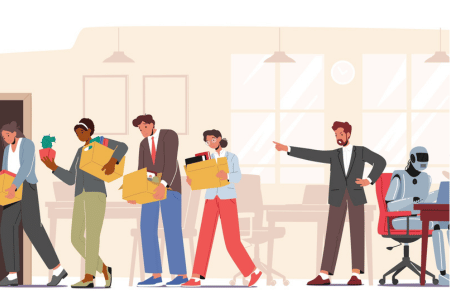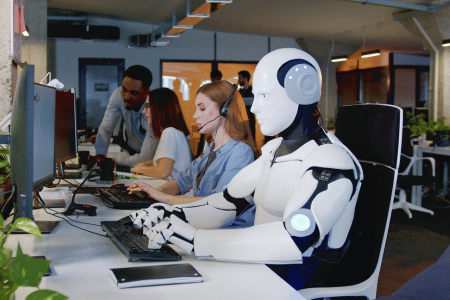[ad_1]
The rise of artificial intelligence has sparked intense debates and speculations across various professions. One of the most hotly debated questions is: “Will AI replace web developers?” The answer is both simple and complex. While the advancements in AI are undeniable, the role of the human touch in web development is irreplaceable.
Will AI Replace Front-End Developers?
Front-end development seamlessly blends design with technology, bringing digital visions to life. As AI tools like Adobe’s Sensei and Wix’s ADI streamline design tasks with automated layouts and trend predictions, many ponder the future of the human touch in this realm.
Human Insight vs. AI Precision:While AI excels in data analysis and trend prediction, it lacks the emotional depth and cultural nuance a human brings. A retro color palette might invoke nostalgia, or dynamic typography could convey urgency—such subtleties are uniquely human insights.
Personalization Beyond Algorithms: AI can curate content, but the human developer infuses empathy and context. An AI might identify a user’s love for outdoor activities, but only a human can understand their emotional ties to hiking due to personal memories.
Collaboration Over Competition: The future isn’t about choosing between AI and humans. Instead, it’s about synergy. Envision AI tools drafting preliminary designs and front-end developers refining them, adding depth and context. This partnership promises richer user experiences and innovative solutions.
Automation of repetitive tasks such as image optimization, code validation, and basic layout designs are increasingly managed by AI. Moreover, tools powered by machine learning are poised to enhance user experience by predicting user behavior and auto-adjusting web interfaces for optimal engagement.
Yet, while these advancements pave the way for more efficient workflows, they don’t negate the need for human intervention. Instead, they free up human developers to focus on the intricacies of design, storytelling, and creating profound emotional connections with users. As AI takes on the routine, it empowers developers to elevate their creative pursuits, ensuring that the digital realm remains both innovative and deeply human.
Will AI Replace Back-End Developers

Back-end development forms the unseen pillars supporting the digital experiences we encounter daily. It ensures that everything works seamlessly in the background when you click on a button or submit a form. Given the advancements in AI, questions loom about its role in back-end development.
Structured Data vs. AI Analysis: Back-end processes often involve handling massive amounts of structured and unstructured data. Modern AI tools, like Google’s AutoML or AWS’s SageMaker, are equipped to analyze vast datasets, optimizing data retrieval and storage processes. However, while AI can manage data efficiently, making critical decisions about data architecture and relationships is a task best suited for humans, who understand the broader implications of these choices.
Automation Beyond Routine: Tasks such as server maintenance, log analysis, and even some security protocols can be automated using AI. Machine learning models can predict server failures or detect unusual patterns that might indicate a security breach. Yet, crafting a robust and scalable server architecture or ensuring data integrity during migrations demands a human developer’s foresight and strategic thinking.
Synergy in Complex Integrations: As businesses adopt a multitude of software solutions, integrating them becomes a complex challenge. While AI can assist in identifying potential integration points, the strategic decision of how and when to integrate requires human judgment, especially when dealing with legacy systems or ensuring business continuity.
Adaptive Problem Solving: Back-end issues are often unpredictable. AI can assist in identifying these issues faster, but devising innovative solutions, especially in crisis situations, requires human intuition. This algorithmic prediction and human adaptability balance ensures that web applications remain stable and agile.
The march of AI in the realm of back-end development is undeniable. Automation capabilities transform traditional tasks like data backups, server scaling, and error logging. Advanced tools powered by AI are reshaping how databases are managed and optimized. They can predict potential system downtimes and enhance performance metrics.
Yet, these technological leaps don’t signal the end of human involvement. The creation of scalable, resilient, and adaptive system architectures — ones that can evolve with business needs — remains a uniquely human endeavor. While AI streamlines the predictable, back-end developers are free to strategize, innovate, and tackle complex challenges that algorithms cannot fathom. As AI shoulders the routine, it propels developers into a new era of strategic and visionary back-end development, ensuring that the backbone of our digital world is both powerful and intuitively designed.
What Web Development Jobs Are Most at Risk and Why?
As the wave of AI-driven automation sweeps across the tech landscape, certain web development roles are at a crossroads. Understanding which jobs are most at risk and the reasons behind this shift is pivotal for aspiring and current professionals in the industry.
Routine and Repetition: Jobs involving highly repetitive tasks are the first to be replaced. Automated tools like code validators or CSS optimizers can handle these tasks more efficiently. Positions that primarily involve routine code maintenance or basic debugging might see a decline as AI tools become adept at these processes.
Template-Based Design: With platforms like Wix and Squarespace leveraging AI to offer automated website design based on user preferences, roles centered around template-based design without much customization might face challenges. AI’s ability to quickly adapt and churn out designs based on vast datasets puts it at an advantage.
Data Entry and Management: Manual data entry is becoming increasingly automated, especially for larger websites or e-commerce platforms. AI-driven tools can scrape, categorize, and input data far more swiftly than humans, making roles centered around this task more vulnerable.
Performance Optimization: As websites become more complex, ensuring they run smoothly is crucial. AI tools are now available that can automatically optimize website performance, adjusting elements in real-time based on user interactions, potentially reducing the need for roles focused solely on manual performance tuning.
Image and Media Processing: Automating tasks like image resizing, format conversion, or basic video editing is becoming more prevalent. Tools powered by AI can process media files, optimize them for web use, and even enhance their quality. As a result, roles strictly focused on these routine media processing tasks might be challenged.
User Testing and Feedback Analysis: AI-driven platforms are emerging that can simulate user interactions on websites, identifying UI/UX issues. Additionally, AI tools can rapidly analyze user feedback, categorizing and prioritizing it, impacting jobs centered solely around basic user testing or initial feedback analysis.
While the above roles might be at risk, it’s essential to understand the bigger picture. Automation can lead to cost savings, efficiency, and reduced error rates. For businesses, this means faster turnarounds and more competitive digital platforms.
The Synergy of Man and Machine

The narrative of AI’s rise in web development often oscillates between awe and apprehension. But the real story isn’t one of competition; it’s one of collaboration.
AI’s Strengths in Numbers: he computational prowess of AI is unparalleled. Tools like TensorFlow or OpenAI’s GPT models can process and analyze data at scales and speeds incomprehensible to the human brain. For instance, AI-driven analytics tools can sift through petabytes of user interaction data in moments, offering previously impossible or extremely time-consuming insights.
Challenges in the Labor Market: It’s essential to acknowledge the realities. As AI automates routine tasks, there’s potential for job displacement, especially for roles focused on repetitive tasks or basic maintenance, reducing demand for entry-level positions and making the initial entry into the web development field more challenging.
Empowerment Through AI: Yet, while AI might eclipse certain roles, it paves the way for new opportunities. Instead of spending hours on debugging or data analysis, developers can now focus on higher-order tasks, which means deeper dives into user psychology, crafting immersive user experiences, or strategizing on the next big digital innovation. With AI managing the quantitative, developers have the freedom to delve into the qualitative.
Training & Adaptability: The onus is on current and aspiring developers to adapt. Continuous learning, upskilling, and focusing on areas less susceptible to automation (like UX design or strategic planning) will be crucial. Institutions and training programs also need to pivot, emphasizing skills that complement AI rather than compete with it.
A Collaborative Future: Envision a world where AI tools draft the blueprint, and human developers infuse it with creativity and strategy. This partnership could lead to efficient and robust digital platforms, which are also deeply engaging and innovative.
While AI’s integration in web development presents challenges, it also offers a vista of opportunities. The key lies in embracing the synergy between man and machine, ensuring that the digital world we craft is both state-of-the-art and soulful.
Staying Ahead: The Key to Staying Relevant
It’s not all gloom and doom. As certain roles diminish, new ones emerge. The focus will shift towards more specialized jobs. Roles centered around user experience design, strategy formulation, or integration of complex systems will likely see growth. Additionally, the human touch in understanding a client’s needs and cultural nuances while creating brand narratives remains irreplaceable.
The path forward lies in adaptability for those in roles that seem vulnerable. Upskilling, continuous learning, and pivoting towards more strategic or creative tasks can ensure career longevity. It’s a call to evolve with the times, much like how web development itself has transformed over the decades.
The Value of Human Expertise at Oyova
Oyova stands as a testament to the enduring value of human expertise. While we harness the latest technological advancements, our team’s human touch sets us apart.
Our Team’s Edge
At Oyova, we pride ourselves on a team that goes beyond mere coding proficiency. Our developers are visionaries, strategists, and digital artists. They understand the complexities of user behavior, the subtleties of design aesthetics, and the art of crafting compelling narratives. This unique blend of skills ensures that each project we undertake isn’t just functional, emotionally resonant, and aligned with the client’s brand ethos.
AI undoubtedly offers powerful tools for efficiency and precision. However, at Oyova, we firmly believe that human expertise—creativity, intuition, and understanding—truly transforms a project. This philosophy ensures our clients always receive web solutions that are not just technologically advanced but also deeply engaging and impactful.
Get Started With Oyova
At Oyova, we stand at the intersection of AI and traditional web development, merging the best of both worlds to deliver unparalleled web development and web design services. Our commitment is to provide solutions that are not just state-of-the-art but also resonate deeply with your target audience, ensuring your brand’s digital presence is both impactful and memorable.
Ready to elevate your digital journey? Dive into a partnership with Oyova and let us craft a web experience that truly captures the essence of your brand. Whether it’s web development that harnesses the latest in AI or design that tells your story compellingly, we’re here to make your vision a reality.
Contact Oyova today and embark on a digital transformation that sets you apart.
[ad_2]











